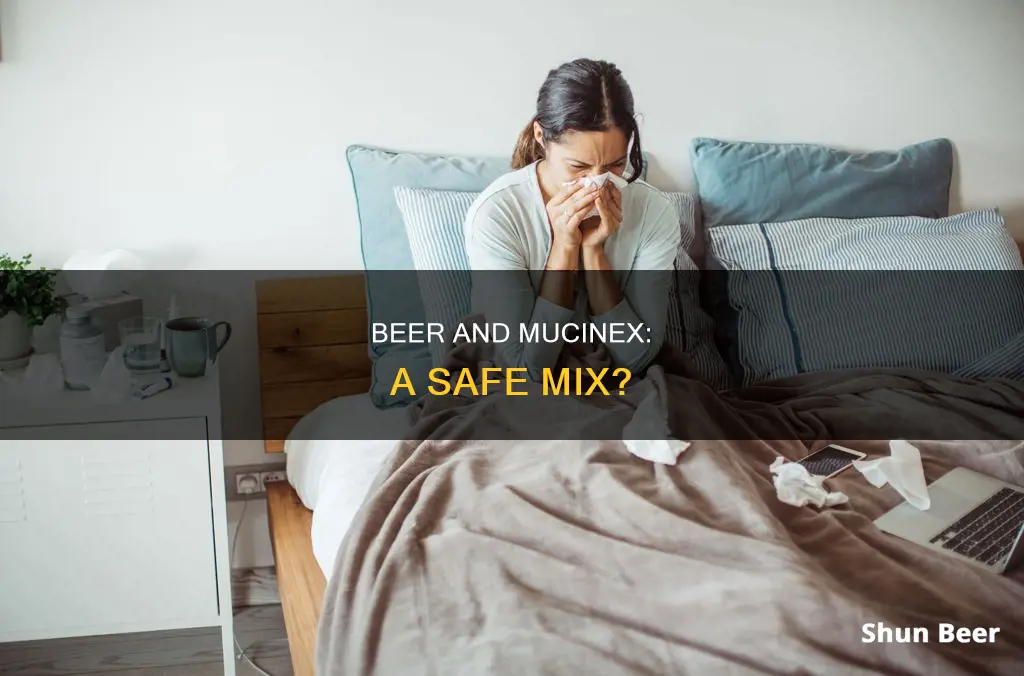
Drinking alcohol while taking Mucinex is generally not recommended by doctors, as it can cause unwanted side effects and increase the risk of overdose. Alcohol is a depressant that can slow a person's breathing, cause dizziness, and affect their balance. It can also interfere with other medications, including Mucinex, and weaken the immune system. Mixing alcohol with Mucinex can lead to severe side effects such as liver damage, rapid heart rate, and an increased risk of overdose. While the main ingredient in Mucinex, guaifenesin, is considered safe, other active ingredients such as acetaminophen and dextromethorphan can interact dangerously with alcohol. Therefore, it is best to avoid drinking alcohol while taking Mucinex to prevent any potential health risks.
| Characteristics | Values |
|---|---|
| Is it safe to mix Mucinex and alcohol? | Doctors generally consider it unsafe to mix Mucinex and alcohol. |
| Mucinex active ingredients | Guaifenesin, acetaminophen, dextromethorphan, phenylephrine, and triprolidine |
| Mucinex side effects | Dizziness, drowsiness, nausea, vomiting, liver damage, rapid heart rate, stomach problems, and increased risk of overdose |
| Alcohol side effects | Slowed breathing, dizziness, and affected balance |
| Mixing alcohol and Mucinex side effects | Increased side effects of both substances, such as increased intoxication, rapid heart rate, liver damage, and increased risk of overdose |
| Mixing alcohol and Mucinex dangers | Severe health issues, such as liver damage, hot flashes, hypertension, anxiety, panic attacks, seizures, neurological damage, respiratory problems, and tolerance or dependence on both DXM and alcohol |
| Recommendations | It is not recommended to mix Mucinex and alcohol. If you have already consumed alcohol, wait until its effects wear off before taking Mucinex. |
What You'll Learn

Mucinex and alcohol can cause liver damage
Mucinex is a medication that contains guaifenesin, an expectorant that helps to thin and loosen mucus in the airways. It is often used to treat chest congestion and coughs. While Mucinex is a popular remedy for cold and flu symptoms, the risks of combining this medication with alcohol are sometimes overlooked.
Mixing Mucinex and alcohol can cause unwanted side effects, and doctors generally consider it unsafe. One of the most serious potential consequences is liver damage. This is especially true for Mucinex products that contain acetaminophen, which is known to cause liver damage when consumed in large amounts. Alcohol affects the enzymes that process acetaminophen, making the liver more vulnerable to damage.
The specific Mucinex products that may cause liver damage when mixed with alcohol include Mucinex Nightshift, Fast-Max, and Sinux-Max. To avoid potential liver damage, it is recommended to limit alcohol consumption to moderate levels, which is no more than one to two drinks per day for men and no more than one per day for women. Additionally, individuals taking Mucinex products with acetaminophen should carefully watch their intake and not exceed 3,000 to 4,000 mg in a 24-hour period.
In addition to the risk of liver damage, mixing Mucinex and alcohol can also lead to other side effects such as increased intoxication, rapid heart rate, dizziness, drowsiness, and an increased risk of overdose. Therefore, it is generally recommended to avoid mixing Mucinex and alcohol to prevent any potential health complications.
Fitbit Beers: Compatible with Pixel 2?
You may want to see also

Mixing Mucinex and alcohol may increase the risk of overdose
Mixing Mucinex and alcohol is generally considered unsafe and is not recommended by doctors. While Mucinex's main active ingredient, guaifenesin, does not have dangerous interactions with alcohol, other ingredients in Mucinex products can lead to adverse effects when combined with alcohol. These ingredients include dextromethorphan (DXM), a cough suppressant, and acetaminophen, a pain reliever and fever reducer.
When mixed with alcohol, Mucinex may increase the risk of overdose, especially in products containing DXM. The combination of alcohol and DXM can lead to dangerous consequences, including increased blood pressure, anxiety, panic attacks, and potentially fatal seizures. Overuse of Mucinex DM with alcohol may also result in long-term effects such as liver damage, neurological damage, respiratory problems, and tolerance or dependence on both substances.
Additionally, mixing Mucinex and alcohol can cause various side effects, including increased dizziness and drowsiness. Alcohol can amplify the side effects of Mucinex, such as drowsiness and dizziness, leading to an increased risk of injury due to impaired balance and coordination. It can also irritate the gastrointestinal tract, worsening symptoms associated with Mucinex.
Consuming alcohol while taking Mucinex can also affect the immune system, making it harder for the body to fight off infections and delaying recovery. Therefore, it is generally recommended to avoid mixing Mucinex and alcohol to prevent any potential adverse effects and health complications.
Beer Drinking at Brimfield Fair: What's Allowed?
You may want to see also

Mixing Mucinex and alcohol may increase the risk of injury
Alcohol is a central nervous system depressant, which means it slows down the activity of the neurons in the brain and spinal cord. It can cause drowsiness, dizziness, and affect balance and coordination. When combined with Mucinex, these effects can be amplified, leading to an increased risk of accidents, falls, and other injuries.
In addition, alcohol can also interact with other active ingredients in Mucinex products, such as dextromethorphan and acetaminophen. Dextromethorphan is a cough suppressant found in some Mucinex products, and when combined with alcohol, it can increase the risk of overdose and cause dangerous side effects such as hot flashes, hypertension, anxiety, and even seizures. Acetaminophen, on the other hand, is a pain reliever and fever reducer found in some Mucinex products. Mixing acetaminophen with alcohol can cause severe liver damage.
Therefore, it is generally recommended to avoid mixing Mucinex and alcohol to reduce the risk of injury and potential health complications.
Wheat-Free, Beer-Friendly: Enjoying Beer Without Wheat
You may want to see also

Alcohol can worsen the symptoms Mucinex is treating
Mixing alcohol with Mucinex can cause unwanted side effects and doctors generally consider it unsafe. Alcohol is a depressant that can slow a person's breathing, cause dizziness, and affect their balance. It can also interfere with other medications, including Mucinex.
Mucinex is often used to treat symptoms of the common cold or flu, such as sinus and chest congestion, body pain, fever, and sore throat. Mixing alcohol with Mucinex can cause similar side effects, including dizziness, drowsiness, nausea, and vomiting. Alcohol may also worsen allergy symptoms such as an itchy nose, sneezing, nasal congestion, sore throat, cough, and headache.
Additionally, alcohol can weaken the immune system, making it harder for the body to fight off illness and recover from sickness. This is especially important to consider if you are taking Mucinex because you are unwell.
Mixing alcohol with Mucinex can also increase the risk of more severe side effects, such as liver damage, rapid heart rate, and an increased risk of overdose. The combination of alcohol and Mucinex can also increase the risk of injury due to severe drowsiness or dizziness, which can affect balance and coordination.
Therefore, it is generally recommended to avoid mixing alcohol and Mucinex to prevent worsening symptoms and potential health risks.
Liquor Before Beer: Is It Safe to Mix?
You may want to see also

Mixing Mucinex and alcohol may increase the chances of substance misuse
Mixing Mucinex and alcohol is generally considered unsafe and is not recommended by experts. While Mucinex's main active ingredient, guaifenesin, does not have dangerous interactions with alcohol, other ingredients in Mucinex products can lead to adverse effects when combined with alcohol. These ingredients include dextromethorphan (DXM), a cough suppressant, and acetaminophen, a pain reliever and fever reducer.
When mixed with alcohol, Mucinex may increase the chances of substance misuse. Alcohol impairs judgment and decision-making abilities, making individuals more likely to take Mucinex in larger doses than prescribed. Additionally, people sometimes misuse Mucinex products containing DXM for its euphoric effects when taken in high doses. Mixing DXM-containing Mucinex and alcohol could increase the risk of misuse, dependence, and addiction.
The combination of Mucinex and alcohol can also lead to various side effects, including increased intoxication, with amplified effects of drowsiness and dizziness. This heightened intoxication can lead to accidents, falls, and injuries. Furthermore, mixing these substances may result in liver damage, especially with long-term alcohol use and high doses of Mucinex containing acetaminophen.
It is important to note that even moderate alcohol consumption while taking Mucinex can cause drowsiness, dehydration, and interrupted sleep. Therefore, it is generally recommended to avoid mixing Mucinex and alcohol to prevent potential health risks and adverse side effects.
A Beer Odyssey: 100 Brews in a Day
You may want to see also







